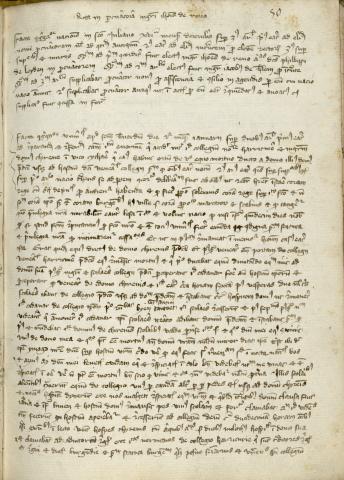Regarding an outrageous incident at the University of Paris | De enormis casu in Universitate Parisiensis
Introduction to the Text
Composed in Paris in early 1413, this Latin passage comes from a book of the proctors of the English/German Nation at the medieval University of Paris. Its author is Johannes de Reno, a master of the University, who was proctor of the Nation at the time. The writing style is simple and almost rushed, reflecting the practical character of the books of the proctors (more on this below). The passage recounts the events surrounding a curious incident which occurred between the scholars of the Collège d’Harcourt and the host of a nearby Parisian lodging house in late 1412. After one of the horses of the lodging house is found dead in front of the Collège, some students repeatedly visit the house and ask for the carcass to be removed, but to no avail; the host even directs ridiculing and vulgar words at them. The angry students therefore drag the carcass back to the lodging house themselves. Later, in the middle of the night, some of the guests of the house and other Parisian burghers attack the Collège, and an extremely violent fight ensues; the situation is partially redressed only through the intervention of the Provost. The passage is interesting because it does not only exemplify the adversarial relationship between ‘town’ and ‘gown’, i.e. local residents and members of the university community, in a town such as Paris, but it can also be useful to observe the impact of current political developments on the university community. The passage can in fact be situated in the context of the Hundred Years’ War and the Armagnac-Burgundian Civil War: in their attack to the Collège, the guests of the lodging house appear to have been motivated by political revenge against its Norman residents, as Normandy had proven to be a troublesome region during the preceding years of war.
Introduction to the Source
Medieval European universities were often organized into a variable number of ‘Nations’ (nationes), semi-independent associations which grouped together students and masters on a broadly geographical basis. The University of Paris had four Nations: the French, the Picard, the Norman, and the English/German one. Compiled by the proctors (elective officials) of the Nations, the ‘books of the proctors of the Nations’ (libri procuratorum nationis) were registers containing chronological entries which documented any significant information about the academic, social, and political life of each Nation and of the university in general. Needless to say, these are sources of unparalleled value when studying early universities. The original manuscripts of the English/German Nation, which survive for most of the 14th and 15th centuries, are currently kept at the Bibliothèque de la Sorbonne in Paris; the manuscript to which the passage belongs is Reg. 5 (fols. 50r-v).
About this Edition
The translation is based upon the edition of the relevant manuscript in Auctarium Chartularii Universitatis Parisiensis: Liber Procuratorum Nationis Anglicanae (Alemanniae), vol. II: Ab Anno 1406 usque ad Annum 1466, edited by H. S Denifle and E. L. M. Chatelain (Paris, 1897), pp. 137-9. To the best of my knowledge, this text has not been previously translated. A shorter version of the incident can be found in later works by Cousinot (145-6), Coville (182-3), Bouquet (113), and Du Boulay (235), which however tend to give it a more pronounced, and in my view distorting, political spin.
Further Reading
Kibre, Pearl. The Nations in the Mediaeval Universities. Medieval Academy of America, 1948.
- The standard work on the topic of medieval nationes; it focuses mostly on their institutional history.
Schwinges, Rainer C. “Student Education, Student Life.” A History of University in Europe, edited by Hilde de Ridder-Symoens, vol. I, Cambridge UP, 1994, pp. 195-243.
- A good introduction to various issues relating to student life in medieval universities.
Skoda, Hannah. Medieval Violence: Physical Brutality in Northern France, 127-1330. Oxford UP, 2013.
- A fresh look at scholarly violence from the passage’s period, with plenty of examples.
Green, David. The Hundred Years War: A People's History. Yale UP, 2014.
- A recent work on the political events that form the backdrop to the passage.
Credits
Text based on by Auctarium Chartularii Universitatis Parisiensis [ACUP]: Liber Procuratorum Nationis Anglicanae (Alemanniae), vol. II: Ab Anno 1406 usque ad Annum 1466, ed. H. S Denifle and E. L. M. Chatelain (Paris, 1897)Translation by Teresa BarucciEncoded in TEI P5 XML by Runqi ZhangSuggested citation: Johannes de Reno. "Regarding an outrageous incident at the University of Paris." Trans. Teresa Barucci. Global Medieval Sourcebook. http://sourcebook.stanford.edu/text/regarding-outrageous-incident-univer.... Retrieved on April 26, 2024.

